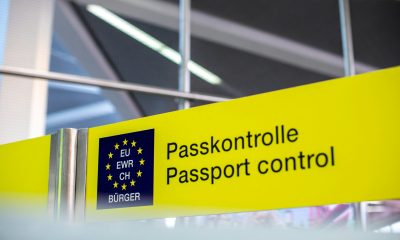EU
צייט צו טוישן: וויסנשאַפֿט 'יוואַלווד ווייַטער פון די קראַנט קליניש פּראָצעס סיסטעם'

 דורך טאני מאַללעטט
דורך טאני מאַללעטט
A crucial area of the work undertaken by the EUROPEAN אַלליאַנסע פֿאַר פּערסאָנאַליסעד מעדיצין (עאַפּם) concerns clinical trials and patient access to them.
One of EAPM's main aims is tackling the broader issues of personalised medicine (PM) in terms of clinical trials, biobanks, data sharing and more while looking towards the EU’s Horizon 2020 initiative.
In its current Specialised Treatment for Europe’s Patients campaign, known as STEPs, it states that Europe needs an environment which allows early patient access to novel and efficacious PM, and a new form of clinical trials will be crucial to acheiving this.
According to EAPM, moving personalised medicine into its next phase will depend on complex international clinical research involving highly selected patient populations, the collection of human biological material and the use of large databases for bioinformatics.
The organization argues that Europe needs a different form of data generation, and the classical approach to clinical trials cannot capture those data adequately. Today, subgroups of patients are being identified within a broad disease category via prognostic or predictive biomarkers. These need to be validated on large populations, so scientific advances in diagnostic refinement and stratification have to be incorporated into trials.
Vital to success is greater collaboration among many partners - industry and academia, statisticians and patients, but also regulators. Smart but robust clinical research methodologies need to be endorsed by regulators and payers, EAPM believes.
"While there might not be a Tea Party in Europe, we certainly feel the need for change,” said Professor Louis Denis, director of the Oncology Centre Antwerp.
“Our system of health policies must change, but a number of stakeholders don’t feel like changing,” he added, while also calling for greater and better European collaboration in basic research.
Professor Denis was backed up by the director of the European Organisation for Research and Treatment of Cancer (EORTC), Denis Lacombe, who said: “All stakeholders should leave their comfort zone. We are heading for new forms of clinical research for PM and all of us – that’s pharma, academia, payers, regulators – need to move forward to a new form of collaboration.”
Lacombe added: “Patients are waiting for therapeutic improvement and asking us - while we have good technologies - are we really bringing them the best new drugs? And if we look hard in the mirror the fact is that we are not using technology optimally.”
“There needs to be more collaboration, new models…and that means we have to think outside the box,” he said.
Karl Solchenbach, Intel Director European Exascale Labs, picked up on the point of collaboration from a technical angle by saying that open-source software licensing would facilitate the exchange of data. He added that Intel had been working in the health sector with high-speed computers to help process research data much more quickly. This would be phenomenally quick in the future, he added.
Ingrid Maes of PricewaterhouseCoopers said: “R&D in the future will be focused on the patient – where is the biggest need? We will build more knowledge and more data will be required meaning more collaboration. This collaboration will not only be within the healthcare space but will involve other data providers, such as Google and Microsoft.”
She added that: “Pharma will have to engage with payers and patients at a very early stage to understand the true value of what they are developing. The emphasis will be on outcomes, clinical, health economic and quality of life outcomes. Outcomes will determine the value of a new treatment and will be the new currency.”
Louis Denis added, in future: “Care should be patient-centred and multi-professional, research must be evidenced-based and conscience-based, there should be no randomised trials without secondary endpoints of quality of life and cost efficacy and we need to improve performance with the same amount of money.”
Edith Frenoy, of the European Federation of Pharmaceutical Industries and Associations (EFPIA), added that: “Science has evolved beyond the current trial system - trials are slow, expensive and inflexible. In the future, large trials may be impossible as treatments become more personalised and science continues to improve our knowledge. This knowledge will bring better outcomes as we remove non-responders through stratification.”
According to EAPM, the legal framework in Europe needs adapting too, not only to permit easier access to smaller groups of subjects, but also to recognize the validity of results from trials much smaller than the classic randomized approach.
It believes that it is necessary to ensure a regulatory environment that responds to the needs of all stakeholders whilst also maintaining patient safety, with the end result of ensuring development of treatments for patients.
And adequate methodologies and infrastructures that support large screening platforms are needed to ensure quality of the research and reliability of evidence, the organisation says.
EAPM believes that progress will frequently mean the use of new technologies for data capture, direct data entry, and real-time response, across smaller multi-centre trials in several countries. Clearer and more harmonised regulation will be essential. And wider support will be needed, to multidisciplinary research, and to public-private partnerships.
Wider harmonization will ease the process, it believes, and help to lower costs and administrative burdens. A new paradigm could introduce a risk-based approach, and bring translational science and elements of health technology assessment into clinical trials, with greater public support for trials.
EAPM is convinced that the development of PM requires complex international clinical trials involving highly selected patient populations, the collection of human biological material and the use of large databases for bioinformatics.
The backbone of the clinical research in PM will be biologically driven clinical trials involving strong translational research components using state-of-the-art technologies such as biomarkers derived from non-invasive molecular imaging.
The organization believes that many drug candidates go into clinical trial without appropriate understanding and documentation of the target biology, which goes some way towards explaining failure at later stages of drug development and the high attrition rate. Also, some of the therapeutic agents might have been successful if they had been tested in the patient group most likely to benefit from the drug.
Today, it says, subgroups of patients are being identified within a broad disease category. But, since the biomarkers and the modelling needs to be validated on large populations, diagnostic refinement and stratification is dependent upon the successful incorporation of scientific advances into clinical trials.
Ian Banks, chair of the ECCO Patient Working Group, agreed that patients need access to better knowledge. He said: “It is impossible to empower patients unless they can understand the information being given to them.”
Banks was backed up by the chair of the EAPM Working Group for Research, Prof. Ulrik Ringborg, who agreed that transmitting information was key to patients’ involvement in their own treatment.
And, more broadly, MEP Petru Luhan said: “We need to continue to tackle the challenge of breaking barriers and learning to speak the same language. Meanwhile, substantial education and training efforts are needed to ensure that knowledge and good practice concerning novel technologies and scientific approaches are shared.
“New discoveries will not get us very far unless we know how to address the challenge of generating knowledge and developing the right tools,” added the Romanian politician.
“And this is equally true when it comes to meeting the challenge of translating new knowledge to medical applications with direct benefit for the patients, including qualifying and validating biomarkers and developing new designs for clinical trials,” Luhan added.
EAPM ס סטעפּס פֿאַר 2014-2019:
• שריט 1: ינשורינג אַ רעגולאַטאָרי סוויווע וואָס אַלאַוז פרי פּאַציענט אַקסעס צו ראָמאַן און עפעקטיוו פערזענליכען מעדיצין (PM)
• שריט 2: ינקרעאַסינג פאָרשונג און אַנטוויקלונג פֿאַר PM, בשעת רעקאַגנייזינג זייַן ווערט
• שריט 3: ימפּרוווינג די בילדונג און טריינינג פון כעלטקער פּראָפעססיאָנאַלס
• שריט 4: שטיצן נייַע אַפּראָוטשיז צו ריימבערסמאַנט און HTA אַססעססמענט, פארלאנגט פֿאַר פּאַציענט אַקסעס צו PM
• שריט 5: ינקרעאַסינג וויסיקייַט און פארשטאנד פון PM
עאַפּם גלויבט אַז אַטשיווינג די צילן וועט פֿאַרבעסערן די קוואַליטעט פון לעבן פֿאַר פּאַטיענץ אין יעדער מדינה אין אייראָפּע.
Tony Mallett is a Brussels-based freelance journalist. [אימעיל באשיצט]
שער דעם אַרטיקל:
-

 יראַןקסנומקס טעג צוריק
יראַןקסנומקס טעג צוריקפארוואס איז דער רוף פון די אי.יו. פּאַרליאַמענט צו רשימה די IRGC ווי אַ טעראָר אָרגאַניזאַציע נאָך נישט גערעדט?
-

 ברעקסיטקסנומקס טעג צוריק
ברעקסיטקסנומקס טעג צוריקא נייע בריק פאר יונגע אייראפעער אויף ביידע זייטן פונעם קאנאל
-

 קירגיזיעקסנומקס טעג צוריק
קירגיזיעקסנומקס טעג צוריקדי פּראַל פון מאַסע רוסיש מיגראַטיאָן אויף עטניק טענסיאָנס אין קירגיזיע
-

 יממיגראַטיאָןקסנומקס טעג צוריק
יממיגראַטיאָןקסנומקס טעג צוריקוואָס זענען די קאָס פֿאַר בעכעסקעם מיטגליד שטאַטן אויס פון אי.יו. ס באָרדערלעסס זאָנע



























